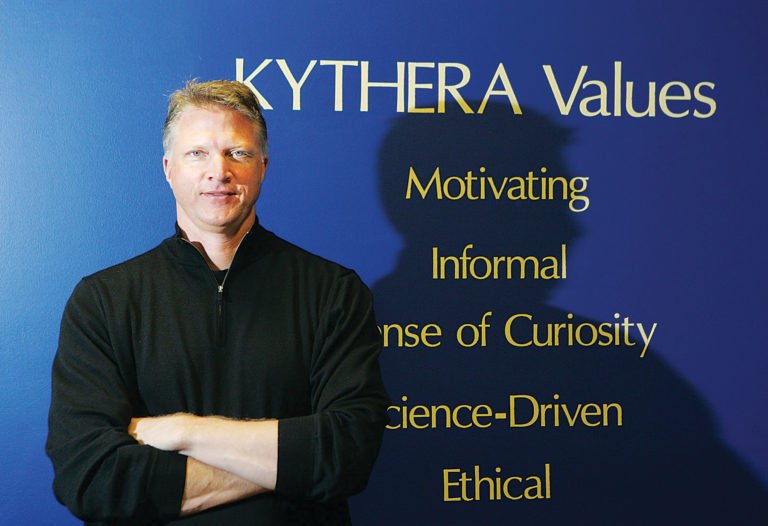
A double chin among wealthy aging women in Los Angeles used to ensure a one-way ticket to the plastic surgeon.
That may be changing.
Kythera Biopharmaceuticals Inc., a Calabasas biotech, isn’t weighed down by the serious challenge of discovering the next cure for cancer or some other life-threatening disease. Rather, the company’s goal is to commercialize a nonsurgical method for dissolving chin fat.
“In our mindset and approach, we’re most similar to Amgen – the difference is our target, our therapeutic areas,” said Chief Executive Keith Leonard, a former Amgen exec who has recruited many former co-workers from the Thousand Oaks drug giant since Kythera launched in 2005.
Indeed, the company’s leading product is a drug candidate that wouldn’t sound out of place in a cancer trial: ATX 101.
The drug works by dissolving the membranes of fat cells in the neck, which are eventually eliminated by the body. A skilled doctor with a syringe filled with the stuff can supposedly sculpt the jaw line with near scalpel-like precision.
The drug is about to enter late-stage clinical studies, and if it is approved by the Food and Drug Administration, Kythera may seek additional approvals to treat other areas of the body prone to fat buildup, such as the bra line and back of the arm.
It’s a huge market. If ATX 101 can bring in a fraction of wrinkle-relaxer Botox, a drug that grosses nearly $1.5 billion annually for Irvine’s Allergan Inc., there’s lot of money to be made. Another experimental Kythera product at an earlier stage of development is a moldable and injectable facial filler that would compete with the popular Restylane.
Specialty beauty and department stores sell a plethora of products that purport to correct fat, wrinkles and other imperfections, but while many claim to have undergone clinical trials, very few like Kythera have gone to the expense of gaining FDA approval. Doing so will allow the company to charge a premium for its product, especially since it would be an elective treatment that insurance companies won’t reimburse.
Ken Cacciatore, an analyst at Cowen & Cowen Co., estimates that if ATX 101 receives approval it could have a global market similar in size to the cosmetic uses for Botox — as much as $500 million to $700 million.
Kythera’s financial backers include Versant Ventures, Arch Venture Partners and the UCLA Ventura Capital Fund. The technology is licensed from scientists working at the Los Angeles Biomedical Institute at Harbor-UCLA Medical Center in Torrance.
The company plans to commercialize the drug on its own in the United States and Canada, but sought a partner to take the drug to overseas markets. In August, Kythera signed a deal, potentially worth $373 million, with Germany’s Bayer HealthCare, to market overseas.
Kythera operates like a semivirtual company. While administration, and eventually sales and marketing, will be based in Calabasas, the company contracts with outside companies to run its clinical trials. It also takes advantage of academic partners’ lab facilities, including Johns Hopkins.
The startup now has about 30 local employees, but soon will add more as it sets up its small laboratory at UCLA’s California NanoSystems Institute. If ATX 101 receives U.S. and other country approvals, the number of employees could grow to several hundred.
“Our goal is to be a key player and to work on some really cool innovative science,” Leonard said. “What we have here is a great match between biotech talent and aesthetics talent.”
Kythera Biopharmaceuticals Inc.
Calabasas
Founded: 2005
Focus: Body fat reduction, injectible filler
Lead Product: ATX 101 chin fat dissolver
in testing
